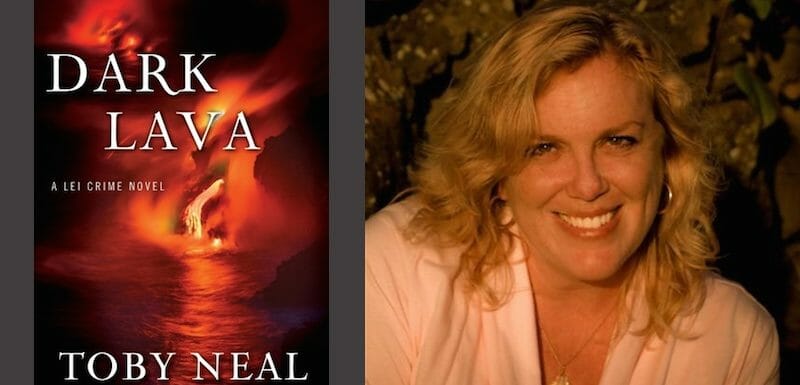 Some crime fiction writers shy away from the question of writing about issues. Hawaii novelist Toby Neal has no qualms about admitting her passion to deal with issues in the land she loves and calls home. Neal’s latest release, “Dark Lava,” bears the tag line, “Maui is sacred places, ancient artifacts, and the dark lava of deepest passions.”
Some crime fiction writers shy away from the question of writing about issues. Hawaii novelist Toby Neal has no qualms about admitting her passion to deal with issues in the land she loves and calls home. Neal’s latest release, “Dark Lava,” bears the tag line, “Maui is sacred places, ancient artifacts, and the dark lava of deepest passions.”
If there’s a single word that best describes Hawaii, it may well be “passion.” The word describes Neal’s writing and the issues she tackles. For this interview Neal said, “One of my priorities as a “regional” writer is to raise the issues we struggle with here in the Islands—economically, socially, politically, etc. I have moved the settings of the books around to each island to capture that island’s unique strengths, geography and challenges. There is an issue or crime we grapple with here in Hawaii that I’m highlighting in every book in the Lei Crime Series.”
In the first Lei Crimes mystery, “Blood Orchids,” Neal’s detective investigated child abuse and drugs. In “Torch Ginger” (book 2), the story revolved around the disappearance of the homeless and cult activity. Neal has also written about gambling and sex slavery/prostitution; wealth, suicide and assisted suicide; and the loss of habitat that has placed many of Hawaii’s native birds in an endangered status.
Readers should note that while Neal tackles difficult issues, she does it in a cross between a police procedural and a thriller that bears no resemblance to a lecture. For instance, in book 4, “Broken Ferns,” she writes about the race and class divide in the islands with a Robin Hood teen criminal “evening the score.”;
Neal’s writing is influenced by her career. She said, “I’m a clinical social worker in private practice as well as a writer, so I use my writing to shine a light on issues though an entertaining read. Readers tell me they’ve come to count on learning something new about the ‘real Hawaii’ in every book and I take that as a compliment!”
In fact, it was those readers who gave Neal the idea for the issue she dealt with in “Dark Lava.” She asked a question on Facebook and her eager fans responded. Neal said, “They wanted a plot involving Hawaiian artifacts, treasures, and sacred spaces (heiaus).”
One of the personal issues facing Neal is her race. As much as she loves Hawaii, she is Caucasian, and therefore classified as a haole, a term that may carry a very negative connotation in some circles. She said, “Hawaii is tattooed on my heart. I had to leave to get education (another struggle; our best and brightest leave, and too often they don’t come back) but my husband and I sacrificed to return to where the housing is as high as New York City and the wages as low as the South. We love it too much to leave.”
Neal is also passionate about the authenticity of her writing. She said, “I’m a third-generation kama’aina (child of the land) and I grew up here in Hawaii. I don’t come from an outsider’s perspective, googling everything and mispronouncing it. No. I’ve lived, worked, surfed, fished, canoed, farmed, sweated, swam, played, sailed, ran, hiked, dove, scuba-dived and sailed these islands, given birth to my children here and struggled to make a living here.”
A prolific writer who says her skills are constantly growing, Neal welcomed the self-publishing model after rejection in the traditional publishing world. “Self-publishing has allowed me to expand as a writer rapidly, across genres even, and build a reader base that would have taken years in the traditional model. I am thrilled to be one of the new successful indie author/publishers.”
In 2010, Neal’s agent decided to retire when the market was flooded with celebrity memoirs and cookbooks. “I was left without representation,” said Neal. “She’d had interest in them but not enough to make an offer on an unknown. So, I decided to just go ahead and self-publish, since it took me two years to get an agent and then another year lost ‘on sub.’That was the hardest decision ever and it felt like the death of a dream at the time.” She added, “But in the end, it’s been perfect.”
One of the biggest challenges Neal faces from the traditional publishing world is that her novels are called “too niche.” With more than 500,000 books sold, traditional publishers may just be missing the mark on this one. Neal said, “People love Hawaii, and everyone who’s been here wishes they could go again. That’s a lot of people, potentially, and if the story is strong and the characters are engaging, it’s a guaranteed good time.”
That guaranteed good time has been demonstrated several times by television series like “Magnum, PI” and two-time success “Hawaii Five-0.” Despite the giltz and lack of realism in the current “Five-O” series, Neal said, “I have to give that show credit for trying to show at least some of the issues I’ve tackled in my books—and showing that even though Hawaii is a physical paradise, it’s filled with people and a very complex, multi-racial, multi-cultural society with all sorts of conflicting agendas and undercurrents that tourists don’t even glimpse.”
Neal hopes that readers are captured by the authenticity of the world of the Lei Crime Series. Her intent is to keep writing stories that include colorful characters, the impetuous Detective Lei Texeira, and her heroic and damaged love interest, Michael Stevens.
For now, Neal has decided to stay the course. “I just keep doing what I’m doing and don’t listen to that ‘niche’ stuff. After all, Louise Penny is killing it in Three Pines, nowhere, Canada, while I have fire dancers, tattooed activists, broken but lovable people, and a dog that’s a hero. We’re bound to get the Golden Dagger award someday.” She crosses her fingers and raises her eyes to heaven. “When they give it to an indie.”
Learn more about Toby Neal on her website at tobyneal.net.

